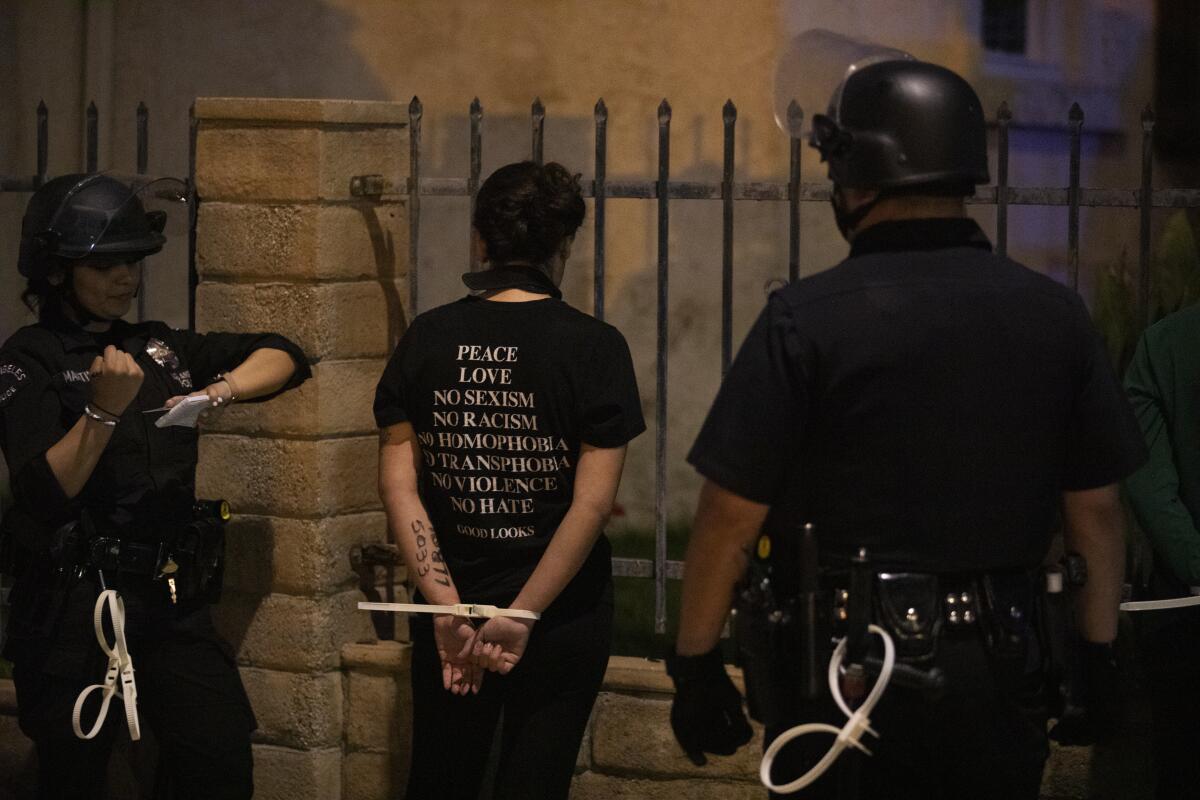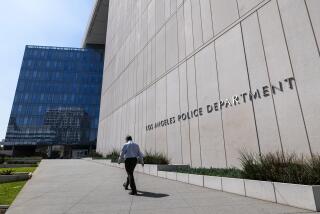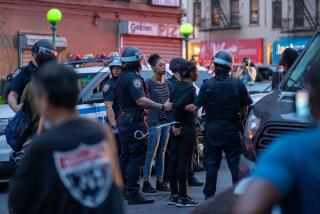Criticized over mass arrests of protesters, L.A. says it won’t seek criminal charges or fines

- Share via
Faced with growing criticism over the arrests of hundreds of peaceful demonstrators, top Los Angeles law enforcement officials said Sunday they will not pursue criminal or financial penalties against the protesters.
The decision follows complaints by many of those arrested that they spent hours in plastic handcuffs in crammed buses without justification, leaving them with injuries and potentially exposing them to the coronavirus. Many of those were taken into custody last week for either violating curfew rules or failing to disperse after the LAPD had declared their protest unlawful.
A lawsuit filed by the American Civil Liberties Union of Southern California and Black Lives Matter L.A. claims the curfews illegally suppressed constitutionally protected protests and violated people’s freedom of movement. The organizations have also decried videos that show police officers responding with violence against protesters, including swinging batons and firing foam and sponge projectiles.
Those advocates said the city’s new stance does not resolve all the concerns outlined in the lawsuit. They added that officials shouldn’t waffle on repercussions but rather dismiss the charges immediately.
“Given what we have seen this week with respect to how LAPD enforced the curfew — the many videos and news reports of excessive force and ambush tactics — any move by the city attorney to force people to defend themselves against curfew charges would be tantamount to sanctioning police repression,” said Adrienna Wong, senior staff attorney at the ACLU.
Though city officials said those protesters won’t face criminal charges, it remains unclear how authorities plan to resolve their cases.
City Atty. Mike Feuer said the process will be “nonpunitive” and “outside of the courts,” and Los Angeles Police Chief Michel Moore said officials are leaning toward leniency for anyone not suspected of vandalism.
Moore said the process will focus on educating those arrested on the legal rationale for curfew and dispersal orders, “so that people are more equipped to understand their responsibilities should they find themselves in a similar situation in the future.”
Moore and Feuer declined to elaborate but said more information would be available Monday.
Police and prosecutors are still pursuing cases against individuals accused of more serious crimes. Rob Wilcox, a spokesman for Feuer, said the city attorney’s office had received at least 30 looting cases from police. The Los Angeles Police Department has formed a task force with other agencies, including the FBI and Santa Monica Police Department, to collect evidence and pursue additional charges as well.
“Ultimately, persons who committed significant crimes such as looting, burglary, robbery, vandalism, arson, and assault with great bodily injury will be held accountable for their actions during the past days,” the LAPD said.
Los Angeles Mayor Eric Garcetti ordered a nighttime curfew five nights in a row after protests in downtown and the Fairfax district were marred by incidents of looting and arson a week ago. At times, the curfews were issued and changed hastily, causing confusion.
Police used the curfews, as well as orders declaring large gatherings unlawful, as justification to sweep people off the streets in huge numbers — possibly into the thousands — amid an all-hands-on-deck mobilization effort. Some applauded the crackdown for restoring order, but others lambasted it as a heavy-handed response to legitimate protests over the death of George Floyd in Minneapolis and other police killings of black people in cities across the U.S.
Curfews also were used by Los Angeles County and surrounding municipalities, as well as other major cities experiencing similar unrest and protests across the country. Los Angeles and San Bernardino counties were also targeted by the ACLU and Black Lives Matter L.A. lawsuit.
L.A. County Dist. Atty. Jackie Lacey, whose office would handle curfew violations in parts of the county without their own local prosecutor’s office, said her office is “not going to pursue” curfew cases either.
She said that she supports the 1st Amendment and that her office has more important cases to pursue.
Lacey’s opponent in the upcoming race for district attorney, George Gascón, has called for all such cases to be dismissed.
L.A. County Sheriff Alex Villanueva said his agency made 475 arrests and would forward its cases to local prosecutors and leave it to them to determine the right course of action.
The lawsuit gave voice to many in the streets who rejected the legitimacy of the curfews and ended up in so-called flex cuffs for their defiance. Moore said he personally spoke to arrestees who rejected outright the notion that police were justified in arresting them for peacefully protesting.
Many credited the ACLU and Black Lives Matter L.A. lawsuit with bringing an end to the curfew. Litigation around mass arrests has shifted the needle before and forced the city to pay out expensive settlements. Such settlements cost the city nearly $13 million after a May Day protest in 2007 and $2.45 million after arrests at Occupy L.A. demonstrations in 2011.
Moore said the lifting of the curfew this time around had more to do with the increasingly peaceful nature of protests in the city, which continued this weekend without major incident.
“As soon as we had a quiet night, [and] we saw business burglaries drop and return to more reasonable levels, there wasn’t a need for that control agent anymore,” Moore said.
Early on, every protester detained for a curfew violation was cuffed and transported to a processing center, sometimes miles from where the person was arrested. Some spent hours aboard buses.
Moore said the process served a purpose in removing people from situations that the Police Department felt had grown unsafe, both for officers and protesters, and allowed the department to restore order to the streets.
He said the department kept those arrested out of corrections facilities after hearing concerns from community leaders about curfew violators being exposed to the coronavirus. On the last two nights of curfew orders, Moore said, police released some violators on the spot after only a brief detention.
How the LAPD handled curfew violators will be part of a much larger, ongoing review of the department’s actions, which marks a pivot out of emergency response and into a more extended phase of reflection, officials said — including assessing whether the police response in this historic moment was too much or too little.
“I understand the criticism from both sides. I appreciate it. And I’m committed to us investigating and determining and bringing forth to those critics on all sides a review of what occurred,” Moore said. “We’ve already begun the process of gathering the information.”
Critics say curfew enforcement unfairly affected homeless people and individuals who were coming from and going to work, despite the fact that both groups were supposed to be exempt from the order.
Amanda Young, 27, of San Pedro said she and a friend were arrested for curfew violations while peacefully protesting after police surrounded them near L.A. City Hall on Tuesday night.
“It was really kind of weird because they were all screaming ‘Go home!’, but no one would let you leave,” she said. “How can you give me an order and then not allow me to fulfill that order?”
Young, who works at the front desk of an animal hospital, said she worries about a hefty fine, and officials saying such penalties won’t be pursued didn’t immediately make her feel better.
“I guess I’ll believe it when I see it, because as far as I know, I still have to show up to court on Nov. 4,” she said.
The LAPD is also winding down other emergency responses and has shifted its strategy to deal with protests, Moore said.
For instance, on Saturday, police tracked 35 different marches and protests in the city, he said. For the vast majority, police left protesters alone, staging officers a couple of blocks away in case they were needed, the chief said.
Police had been criticized for staging in huge numbers around previous protests and escalating tensions with protesters. They also have been accused of excessive force, including in many incidents caught on camera. Several of those incidents are now under review.
Four officers involved in pulling a driver out of a vehicle in Van Nuys after smashing the driver’s side window have been assigned to administrative duties pending an investigation, Moore said. He said he was not aware of any other officers having their status changed because of incidents involving protesters.
City Councilman Mike Bonin over the weekend sent a letter to Moore demanding a broad investigation of “not just individual instances, but of underlying policies and of strategic decisions” by police.
Moore said the National Guard was leaving the city Sunday, but about 250 personnel would remain on standby at a nearby military facility.
The police chief said the LAPD is also beginning to demobilize. About half of the officers on the force would have their first days off in a week on Monday and Tuesday, and the other half on Wednesday and Thursday, he said.
More to Read
Sign up for Essential California
The most important California stories and recommendations in your inbox every morning.
You may occasionally receive promotional content from the Los Angeles Times.












